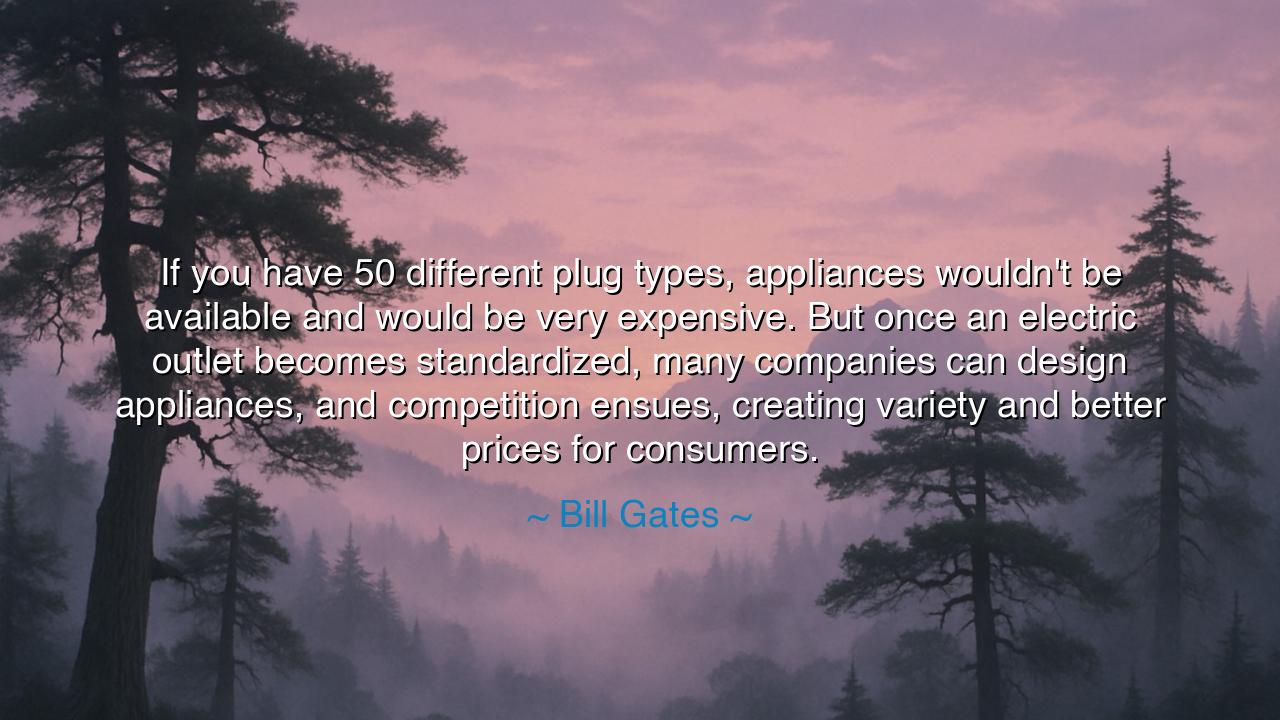
If you have 50 different plug types, appliances wouldn't be
If you have 50 different plug types, appliances wouldn't be available and would be very expensive. But once an electric outlet becomes standardized, many companies can design appliances, and competition ensues, creating variety and better prices for consumers.






Bill Gates, the modern architect of the digital age, once said: “If you have 50 different plug types, appliances wouldn’t be available and would be very expensive. But once an electric outlet becomes standardized, many companies can design appliances, and competition ensues, creating variety and better prices for consumers.” Though spoken in the practical language of technology, this quote carries a wisdom that transcends electricity and commerce. It is a teaching about unity, order, and the power of shared foundations — that progress does not flourish in chaos, but in cooperation. Gates speaks not merely of plugs and sockets, but of the principle of standardization, which allows civilization to advance beyond the limits of individual invention and into the realm of collective creation.
The meaning of this quote lies in the recognition that freedom alone is not enough to build greatness — it must be guided by structure. A world with fifty incompatible plug types would be a world of isolation, where every inventor works in a vacuum, every household lives in inconvenience, and every spark of innovation dies alone. But when a common system emerges, when one form becomes the bridge between all others, creativity blooms. Each company, each creator, can now focus not on reinventing the outlet, but on building upon it — crafting better tools, cheaper solutions, and richer experiences. This is the secret of civilization itself: shared standards give birth to infinite diversity.
The origin of Gates’s insight comes from his lifelong pursuit of connection — both digital and human. In the early days of computing, systems were fragmented, languages incompatible, machines unable to communicate. But through the creation of standardized platforms, such as the operating systems that unified personal computers, Gates saw how the world could be transformed. Standardization did not stifle creativity — it multiplied it. Just as the electric socket allowed every home to light up, so too did the software platform allow every mind to contribute. Thus, his analogy is not about electricity alone, but about the very architecture of progress.
History provides countless reflections of this truth. When King Hammurabi of Babylon carved his laws into stone nearly four thousand years ago, he did more than rule — he standardized justice. For the first time, all citizens, rich or poor, shared one code. This unity allowed trust, trade, and civilization to flourish. Centuries later, when the Romans built their empire, they too understood the power of standardization — their roads, coins, and measurements became the threads that bound nations together. And when Johannes Gutenberg standardized the printing process, he unleashed an era of knowledge that reshaped humanity. From law to roads to words, the pattern is the same: when we agree upon one foundation, the towers of creation rise higher.
Yet Gates’s wisdom carries a warning as well. Standardization must serve progress, not control it. When unity becomes uniformity, when structure becomes tyranny, the spirit of innovation is suffocated. The goal is not to make all things the same, but to give them a shared language through which their differences can shine. The socket does not dictate the design of the lamp — it merely allows the lamp to live. Likewise, in human society, common principles — of truth, respect, and justice — allow each culture, each mind, to create its own light. Diversity cannot thrive without connection; connection cannot endure without order.
Consider the story of Nikola Tesla and George Westinghouse, who together brought alternating current to the world. Before their system triumphed, electricity was fractured by competing technologies and incompatible devices. But through the establishment of a universal current, power flowed freely across cities and continents. That simple act of alignment — one standard voltage, one plug — became the invisible foundation of modern life. From it came light, warmth, industry, and comfort for billions. What began as a technical decision became an act of human liberation, proof that cooperation can magnify the strength of every individual mind.
The lesson, then, is both practical and profound. Whether in technology, art, or daily life, seek not chaos in the name of freedom, nor rigidity in the name of order. Strive instead for harmony, where systems work together to uplift all who use them. In your work, find the shared principles — the “outlets” of understanding — that allow others to connect with you. Build your creations so that others may build upon them. For the mark of true genius is not to stand apart, but to create the foundations upon which others may stand taller.
So remember, my children of the modern age: the spark of progress ignites only when it can flow through a common current. Whether you are building machines, businesses, or relationships, create spaces where connection is possible, where competition births excellence, and where shared vision brings abundance. For it is not isolation that makes mankind powerful, but the quiet agreement — the single outlet in the wall of civilization — that lets all our lights shine as one.






AAdministratorAdministrator
Welcome, honored guests. Please leave a comment, we will respond soon